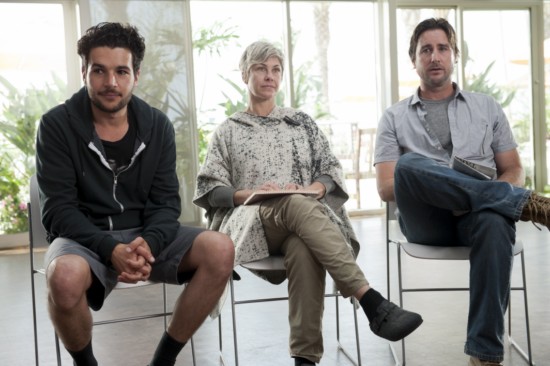
1. In the “mea culpa” world this past week, Minami Minegishi of the hit Japanese band AKB48 was publicly lambasted and forced to apologize on YouTube, where people have watched her tearful confession roughly 5 million times, for the crime of staying a night with her boyfriend. No one’s ever done a fantastic job with managing celebrity expectations, but this takes the cake, ht AOC:
“As a senior member of the group, it is my responsibility to be a role model for younger members,” she said, before ending the four-minute mea culpa with a deep, lingering bow.
The most striking thing about her apology, however, was her appearance. She had shaved her head, a traditional act of contrition inJapan, but perhaps a step too far for a 20-year-old woman whose “crime” was to have found herself a boyfriend – 19-year-old Alan Shirahama, a dancer in a boyband….
Her dramatic gesture underlined the strict rules to which Japan’s young pop stars must adhere to project an image of unimpeachable morals. In the YouTube video, which has been viewed more than 3m times, Minegishi said the assignation has been “thoughtless and immature”.
It just goes to show how constricting success can be, especially when being a public figure simultaneously means being a moral paragon for millions of teenage girls. The band’s music videos, of course, lack nothing in the way of sexual content, which obviously appeal to a contemporary world where sharing a bed is just the beginning–but from the public, culturally representative figures we identify with, nothing less than total ‘purity’ is demanded. And the apology video, featuring a devastated 20-year-old, is nothing less than an instantiation of human shame–a heartbreaking attempt at atonement which, of course, we identify with equally, if not more, than our cultural paragons. But the music is admittedly catchy…
2. In the religion department, The Atlantic celebrated Super Bowl week with a psychologically-attuned look at sports fandom through the lens of religion, specifically the need for group identification (a la Durkheim) and higher meaning. Poor Chargers fans:
Why, in my own case, do I feel the need to sport a Chargers cap on fall Sundays sitting in front of the television when decades of futility, not to mention common sense, suggests it has little effect on outcome?
Alas, formal, organized religion in America today seems but a shell of its former self. A recent Pew study noted that the percentage of the U.S. public declaring themselves religiously “unaffiliated” had grown to one-fifth, including one-third of those under 30—the highest figures in the poll’s history. Faith in other institutions—family, one’s employer, political entities—is equally dwindling, though such institutions once also rooted the individual in something larger.
What totems, therefore, still survive in this culture of ours? The Red Sox. The Packers. The Lakers. And so on. The notion that sports remain our civic religion is truer than we often let on: In fandom, as in religious worship, our social connections are brought to life, in the stands as in the pews. It serves as a reminder of our interconnectedness and dependency; it materially indexes belonging.
While this may seem like a depressing take on sports, or one that casts them as threatening traditional religion, it’s certainly practical for the reasons above. The stand-out to me was a reminder of dependency–we can identify strongly with the success or failure of something completely beyond our control–and the checks it places on individualism. Superstitions like arranging beers in a Colts symbol, or sitting in the same couch space for every game, allow us to imagine an agency over the game’s outcome, but this control is so much fun precisely because, in the end, it stands to highlight dependency.
3. Over at Patheos, Mbird-favorite and Fall conference speaker Dan Siedell published a fantastic exploration of faith and the paintings of Paul Cézanne, looking at Cézanne as a window into the givenness/gratuity of daily experience and our role as passive, contemplative receivers of it:
The “right eyes” [to see Cézanne’s paintings] came as I suffered as a human being and experienced failure as a husband, father, and art historian. They came as I witnessed similar suffering and failure in the lives of the artists about whom I cared so deeply. The “right eyes” came when I looked at Cézanne’s paintings and saw them as artifacts made by a human being who suffered his vocation, suffered his artistic project, struggling with doubt his entire life.
What was his artistic project?
Cézanne’s lone artistic goal was to paint nature as he experienced it, as he received it, “sur le motif,” as he would say—that is, out in the landscape where he would set up his easel…
Many of his admirers claimed that his greatest gift was to paint the weight of his subjects, whether it was a head, house, or oak tree. One hostile critic claimed that he could even paint bad breath. Rather than claim to ascend to the Good, the True, and the Beautiful, Cézanne, who quoted Virgil and Horace “by the yard,” was content to set up his easel in the secluded countryside and receive the world as it was given to him that day, at that moment.
Cézanne’s art and life is a reminder that we live our lives sur le motif. We are always “in it,” that is, in the terrible beauty, suffering, and terrifying givenness of the world, as our stomach churns and our mind races. Heidegger said that Cézanne’s paintings declare one thing: “life is terrifying.”
And yet, Cézanne’s paintings might say one word more. Although it is terrifying, full of pain, suffering and doubt, if we allow ourselves to sit still, perhaps lizard-like, and look closely enough, we can receive life as a gift.
PS: We trust you saw the announcement of Dan’s breakout session at the Spring 2013 Conference in NYC, on “Death and Life in the Artist’s Studio.” Very excited about this.
4. The New Republic recently took a fresh look at addiction, trying to answer the worthy question of “Why Rehab Fails“:
You check in, detox, and then go to addiction-education lectures, group therapy, and AA twelve-step meetings. “I often found myself wondering, ‘Where’s the counseling?’” writes Fletcher. Patients attend these group gatherings for 28 to 90 days, and are then released back into the real world. Problem is, the real world is teeming with temptations, and most people relapse. So what do we do with them? More rehab! Because it isn’t the rehab that has failed; it is you…
By the end of Chapter 5, which is called “Rehab Isn’t for Everyone: In Fact, It’s Not for Most People,” Fletcher begins to wonder if rehab is right for anyone. Mark Willenbring, a psychiatrist and the former head of the Division of Treatment and Recovery Research at the National Institute on Alcohol Abuse and Alcoholism, gives her a stark answer: “The idea of changing the life course for people with severe, recurrent forms of addiction through a time-limited intensive transformative rehab is a fatally flawed relic of ancient times. What other chronic disorder do we treat that way?”
She draws a distinction between individual failure and the failure of the program, writing against the idea that people are always to blame for failure in rehab and implying we should question the institutions instead. Sure, individual striving and failure and more striving (perhaps in another rehab) is ineffective and produces guilt that may worsen the addiction. But she misses the possibility that it really is “you” who have failed, and realizing this failure (AA’s step 1, Christianity’s step 1) can be the best beginning for recovery.
Again, changing the course of one’s life from a deep addiction really is “an outdated relic of ancient times”, but again, the recognition of the powerlessness to change is key for AA. Anthropologically, the articles a wonderful and needed take on addiction but, from the standpoint of actual, spiritual change (and its evaluation of AA), it seems pretty limited.
Also, DZ tells me that the most recent episode of HBO’s Enlightened, “Higher Power”, is a tour-de-force about rehab. For viewers, AV Club did a very sympathetic episode review here.
5. And in the realm of NBC anthropology, Gawker says Farewell to 30 Rock, “the Show That Never Stopped Laughing at the Horrifying Loneliness of Being Human.” A few highlights, ht JD:
the polite, somewhat bored appreciation is much less than the show deserves. 30 Rock has been a brave and meaningful series, with a moral force behind its joke-a-minute slapstick pacing. It’s maybe the last show on television to believe that jokes can do something more than cheer you up.
Each of 30 Rock‘s moments of misunderstanding, taken in isolation, upsets the viewer. It’s sad that this friendship can’t grow, or that this romance won’t work, or that this page is rotting at his core. But the show tempers that disappointment. As of last week, each character had earned a major triumph—Liz and Jenna find happy domestic lives, and Jack and Kenneth find powerful positions at Kabletown. And, more importantly, 30 Rock’s viewer never needs to take any of these moments in isolation. The next joke will happily move you along.
6. In politics, the National Review and Andrew Sullivan debate gun control and the Second Amendment from the standpoint of Christianity, specifically biblical teachings on violence and self-defense. Both articles are theologically interesting beyond the mere political, focusing on themes of protection and aiding the weak (NR) and Sermon-on-the-Mount-style passivity (AS). While the gun control debate is at best a peripheral issue in Christianity, the articles are well-written and interesting reading.
7. And as a useful rejoinder to any Christian political debate, spring conference speaker Tullian Tchividjian posted an excellent little piece at The Gospel Coalition on the inverse relationship between presumption and (experienced) grace, looking especially at narcissism’s role in clouding our perception of grace:
We’ll always maintain a posture of suspicion regarding the radicality and hilarity of unconditional grace as long as we think we’re basically OK. Our presumption of “okayness” leads to a self-deception that robs us of the joy of our salvation and the undomesticated freedom that Christ paid so dearly to secure for sinners like me.
Martin Luther shows how probing the problem of presumption is and reveals that our so-called progress may not be as impressive as we think it is:
Presumption follows when a man sets himself to fulfill the Law with works and diligently sees to it that he does what the letter of the Law asks him to do. He serves God, does not swear, honors father and mother, does not kill, does not commit adultery, and the like. Meanwhile, however, he does not observe his heart, does not note the reason why he is leading such a good life. He does not see that he is merely covering the old hypocrite in his heart with such a beautiful life. For, if he looked at himself aright–at his own heart–he would discover that he is doing all these things with dislike and out of compulsion; that he fears hell or seeks heaven, if not also for more insignificant matters: honor, goods, health; and that he is motivated by the fear of shame or harm or diseases….But because he does not see this bad reason, he lives on in security, looks only at the works, not into the heart, and so assumes that he is keeping the Law of God well.
Amen to that!
8. Finally, Grantland ran an amusing character-by-character homage to one of our favorite TV shows, NBC’s Parenthood:
This show is going to make you cry. This show is going to make you call/text/hug someone in your life and tell them you love them. Don’t be a tough guy. Don’t fight it. Embrace it. Let the tears flow, let the snot drip, and let your face crumble into rubble like a toppled building. You are powerless over it, so enjoy it. I swear that in the writers’ room where they have those corkboards with colored index cards on them, they have a special color for “cry moments” and put two of them in every episode, one at the end of the fourth segment and one at the end of the fifth. The equation works like this:
Major Character Disappointed + Revelation + Long Reaction Shot + 1970s Easy Listening Folk Jam = Cry Moment
There is something about being moved to tears that makes you feel alive, makes you remember what is important, and makes you want to make changes in your life. Yeah, Parenthood will do that for you.
Bonus: Also in the realm of shame/public confession, Deadspin posted a “legitimately creepy” video of Lance Armstrong covering Radiohead’s “Creep”, edited from the Oprah interviews. Despite the humor and stiltedness of the video/sound editing, it really does capture a small sliver of Armstrong’s shame, public rejection, and self-haranguing from the interview. Vulgarity warning in effect.
[youtube=https://www.youtube.com/watch?v=SuhiIItERLo&w=600]
[youtube=http://www.youtube.com/watch?feature=player_embedded&v=kkgtLs0W8SI&w=600]

COMMENTS
One response to “Another Week Ends: AKB48, More Super Bowl, Seeing Cézanne, Failed Rehab, Humanity According to 30 Rock, Presumption vs Grace, and Creepy Lance Armstrong”
Leave a Reply

















I love the article from Andrew Sullivan but in my view, it DOES seem to come off as attempting to maintain a certain political position. What about Exodus 22:2? In my studies, Jesus rebuked the disciple for cutting off an ear of his accuser because he knew the gravity of what must be fulfilled. And as far as turning the other cheek, I believe Jesus uses this to teach us about being slow to anger. If an attacker means to kill you, it doesn’t do much good to turn the other cheek when you’re dead, making Exodus 22:2 more sensible and less of a stretch than Andrew’s argument. I believe we’re also all pretty familiar with the difference between ‘to murder’ and ‘to kill’ (as in self-defense).